How to cook moist, tender chicken that makes a perfect meal and leftovers everyone will love
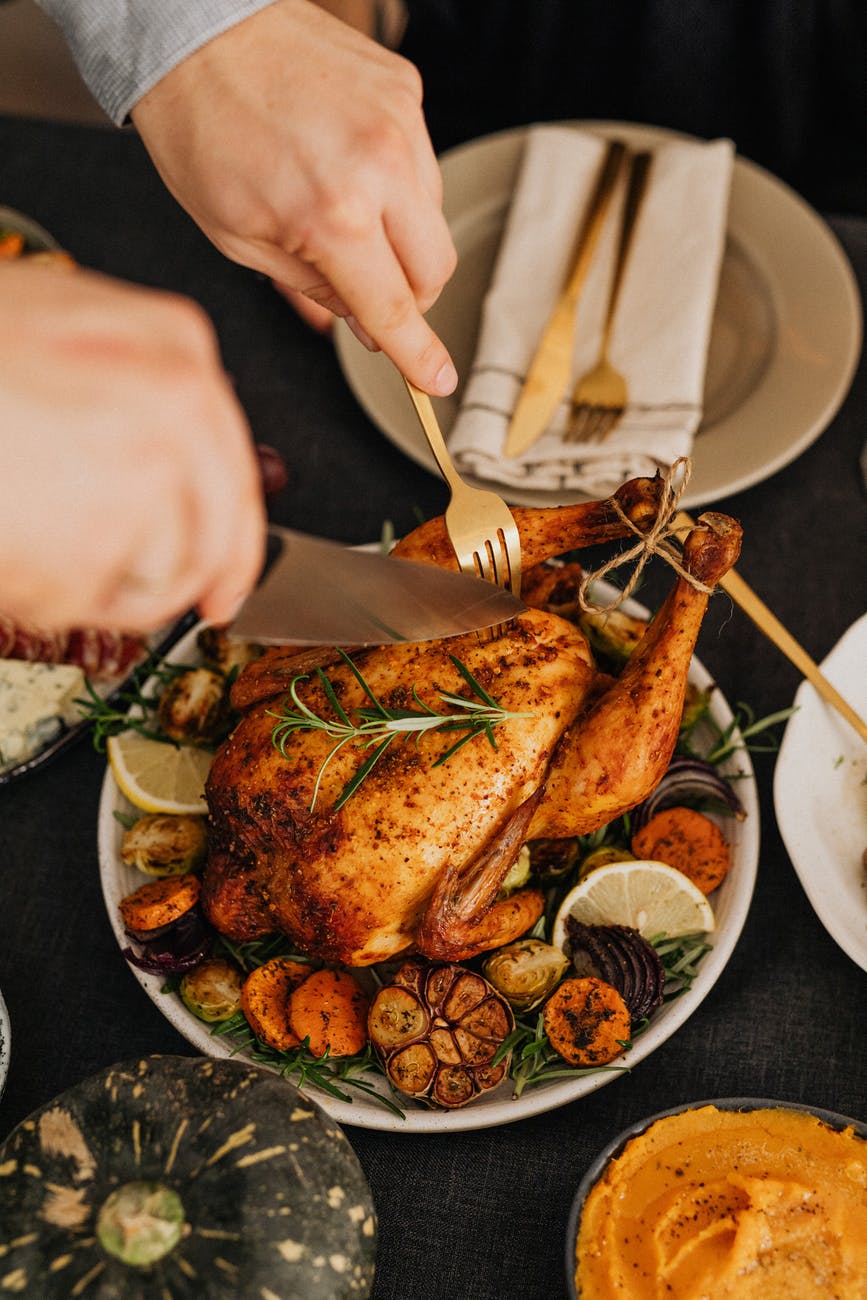
There are basically three types of chickens and then there are the wild birds like pheasants. Creating the perfect roast chicken isn’t difficult.
- Chickens are least expensive when they have been raised on large farms. They don’t get grass or much room. We are not always sure just what they were treated with or fed. But you know what? I’m not against buying and eating them. Why? Because, in the end, it’s about balance. Stressing over the perfect diet isn’t going to improve your health. Our bodies are designed to deal with a lot. Thus, I have certainly eaten my share of really inexpensive chicken.
- Next are the Organic free range chickens. If you buy these at the supermarket, be aware your idea of free range and the farm’s idea may not be the same. Not all free range chickens are living on green grass. Still, the quality of meat is probably better, but the cost is also higher. The possibility of a drier finished product is also higher.
- Last, there are the “home grown” or locally raised type. These have the best flavor and, I think, the best nutrition. The bird has usually lived a natural life eating grass and bugs along with grain. I’ve never met a vegetarian chicken. They like bugs and worms. These are the most likely to be a little tough. I don’t have much of a problem with the birds I raise, but I have a secret weapon if I am ever in doubt.
No one wants to serve tough or dry chicken.
Unfortunately, I have had the sad experience of realizing I cooked the bird a little too long or otherwise dried it out. Slicing into dry chicken breast is not very appealing. Poultry processors commonly inject the bird with salt water. This will be on the ingredient label. The water does a couple things, including adding weight so you pay more for the bird, but it’s purpose is to help prevent dry-out with cooking. Natural birds don’t have the added water and salt so they are more apt to be dry if over-cooked.
Now I want to share my secret weapon with you.
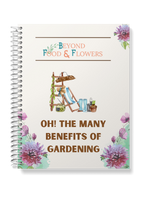
TAKE BACK YOUR VITALITY!
Learn more about the health benefits of gardening and get some good tips and instruction too.
Using this marinade and cooking method gives moist, tender chicken without any strong flavors.
Why is it important to avoid strong flavor?
Because you might want to make a variety of meals later in the week
I landed on this marinade recipe years ago. I’ve made a few changes and, it makes the perfect roast chicken. Sometimes I use a white wine for marinade, but there is always that lingering flavor. White wine makes a good marinade if I have small pieces of chicken. Wine is tends to create “mushy” meat, especially with long marinade times. It also leaves a fairly strong flavor. If I have a cut up chicken and plan to make Greek soup with the leftovers then I might choose wine.
I use the powdered buttermilk 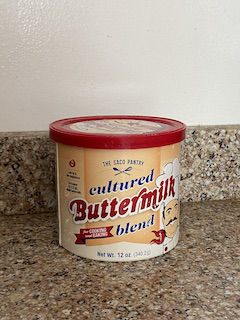 found in the baking isle. It stores well in the fridge and is ready when I want some for a recipe.
found in the baking isle. It stores well in the fridge and is ready when I want some for a recipe.
Buttermilk is the quintessential marinade for chicken. It penetrates well and does not break down the meat fibers so it avoids the overly soft or “mushy” consistency. If you don’t have easy access to buttermilk feel free to substitute with plain Kefir. What about vegan buttermilk? This question really interests me because I consume very little dairy. I haven’t tried it yet. I did look at some recipes for vegan buttermilk and they all involve mixing a small amount of lemon juice into nut milk. The objective here is to avoid making the marinade overly acidic and breaking down the meat fibers. If you have experience with vegan buttermilk as a marinade I would love to hear about your experience.
I mix the ingredients in a smoothie cup or blender but that isn’t necessary as long as everything gets mixed together.
My birds and they all go to the butcher at the same time, so I am always starting with a frozen bird. This works with fresh poultry as well.
If your bird is frozen you can safely thaw it by:
- Putting it in the refrigerator until it thaws. Allow 24 hours for each couple of pounds.
- Putting it in a plastic bag to keep it dry and clean, then submerging the bagged chicken in cold water, changing the water at least every 30 minutes.
Avoid these thawing methods:
- Microwave: It just starts to cook the meat and makes it tough.
- Sitting on the counter: The bacteria will be happy and multiply
- Soaking in warm water: Leave the hot bath for yourself. Soaking poultry in hot water just increases bacteria.
- Food Poisoning is NOT fun.
- Next:
- Once the bird is about half thawed out, (enough that you can clean out the cavity), you can begin creating the perfect roast chicken. I mix the marinade ingredients and pour them over the chicken in a plastic bag. I seal up the bag and put the whole thing in the refrigerator for a couple days. Really, the marinade works in about 8 hours if you have a small bird (4 pounds or less). If you are talking about an 8 pound chicken or turkey then you need more time.
This makes a perfect roast chicken for Sunday dinner. Consequently, you might want to consider cooking up an extra bird if you are inviting friends to dinner.
The left over chicken can be chunked for soup or stew and/or shredded for salads and tacos. It’s delicious in stir-fry. So give this a try on your most free day and you will have easy lunches and suppers for several days.
To Cook the marinated bird:
Heat the oven to 400 degrees.
Remove the bird from the marinade and place on a rack in a baking pan or in a roasting pan. Put 1 to 2 cups of water in the bottom of the pan.
I like to stuff the cavity with a carrot, a couple stalks of celery, an onion sliced in half and a couple sprigs of rosemary if I am not using stuffing (dressing). Feel free to use your favorite stuffing recipe. Alternatively, rub the inside of the cavity with poultry seasoning.
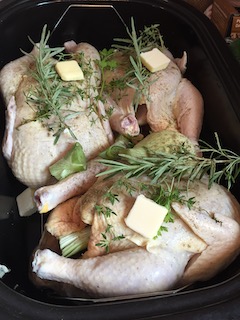
Next: Cook the chicken for about 10 to 15 minutes or until the skin looks dry.
This seals in the moisture.
Now turn the oven down to 325 degrees and cook for an additional 20 minutes per pound
Use a meat thermometer to check for doneness. Poultry is done when it has an internal temperature of 165 Degrees F
Give the bird a rest! This is one of the secrets to creating the perfect roast chicken.
Move the cooked chicken onto a serving platter and let sit for at least 15 minutes. This gives time to make gravy and mash potatoes. It also lets it finish cooking and stay moist.
The marinade recipe is below. The recipe includes both honey and rosemary. Feel free to adjust both of these to suit taste.
Don’t forget to save the bones and make chicken stock. I love my Instant Pot for creating good bone broth. More on that later but here is the Marinade recipe.
Give this versatile and easy roasting recipe a try.
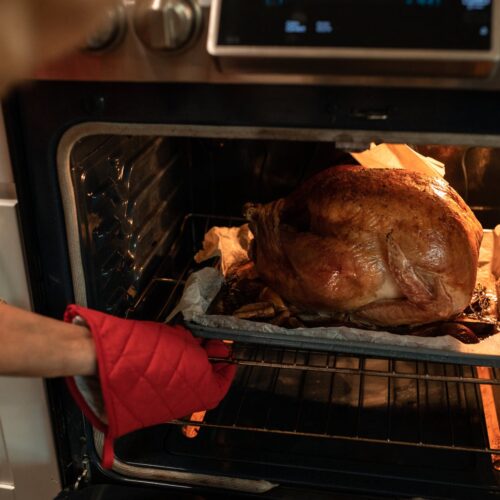
Perfect Poultry Marinade With Buttermilk or Kefir
Ingredients
- 2 cups buttermilk or plain kefir
- 3 TBS olive oil
- 1 TBS honey
- 2 TBS Rosemary feel free to substitute other herbs to taste.
- 1 tsp salt
- 1 tsp pepper
Instructions
- mix all the ingredients
- Put the chicken into a heavy food storage and add the marinade
- Let the excess air out of the bag and seal it up. Move everything around to evenly coat the chicken.
- Place the bagged chicken into a large bowl or pan with the breast down and store in the refridgerator for up to 4 days. If storing longer than a day, flip the bird over to be sure every part of it gets time sitting i the marinade.
To bake:
- Preheat oven to 400F
- Remove bird from marinade and drain any extra marinade
- Place bird in a roasting pan or in a pan with a rack
- Add 1-2 cups of water to the bottom of the pan. You want to keep the delicious juices from burning to the bottom of the pan. Adding a little water helps make good broth and gravy.
- Place in the oven for 10 to 15 minutes or until the skin looks dry but NOT burnt.
- Turn the temperature down to 325F and continue to cook for 20 minutes per pound or until a meat thermometer reads 165 degrees F
- Remove from the oven and allow to rest for 15 minutes.
